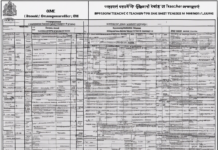Introduction
Obtaining a Caste Validity Certificate is a crucial process in countries such as India where caste-based reservations are prevalent in educational institutes and various government schemes. This certificate essentially validates an individual’s caste and ensures they can avail the benefits allocated for their community. However, navigating this process can be daunting due to the bureaucratic procedures involved. In this article, we will delve into the intricacies of the Caste Validity Certificate process, the significance of the certificate, the eligibility criteria, application procedure, and common challenges faced by applicants.
Understanding the Significance of the Caste Validity Certificate
The Caste Validity Certificate holds immense importance for individuals belonging to scheduled castes, scheduled tribes, or other backward classes. This certificate is a crucial document that acts as proof of the individual’s community status. It enables them to access reserved seats in educational institutions, secure jobs through reservations, and avail various government welfare schemes specifically designed for their community.
Eligibility Criteria for Caste Validity Certificate
To apply for a Caste Validity Certificate, the applicant must fulfill certain eligibility criteria. These criteria typically include:
-
Proof of Caste: The applicant must belong to a recognized scheduled caste (SC), scheduled tribe (ST), or other backward class (OBC) as per government guidelines.
-
Residence: The applicant should be a resident of the state where they are applying for the certificate.
-
Non-Availability of Certificate: In cases where the applicant already holds a Caste Validity Certificate from another state, they are generally not eligible to apply for a new one.
Application Procedure
The application process for obtaining a Caste Validity Certificate involves several steps. These steps may vary slightly depending on the state government’s specific requirements. Here is a general overview of the application procedure:
-
Documents Required: The applicant needs to gather essential documents such as proof of identity, address proof, caste certificate (if available), educational qualifications, etc.
-
Application Form: The applicant must obtain the prescribed application form either online or from the concerned government office.
-
Submission: The filled application form along with the necessary documents should be submitted to the designated authority.
-
Verification: The authorities will verify the information provided in the application and conduct inquiries to authenticate the applicant’s caste status.
-
Certificate Issuance: Upon successful verification, the Caste Validity Certificate will be issued to the applicant.
Challenges Faced by Applicants
Despite the significance of the Caste Validity Certificate, many applicants encounter challenges during the application process. Some common issues include:
-
Delayed Processing: The application process is often marred by delays in verification and issuance of the certificate, leading to frustration among applicants.
-
Documentation Errors: Incomplete or inaccurate documentation can lead to rejection of the application, necessitating re-submission and further delays.
-
Verification Hurdles: The verification process, which involves confirming the applicant’s caste status, can be a lengthy and arduous task, contributing to delays.
-
Lack of Awareness: Many individuals are unaware of the importance of the Caste Validity Certificate or the specific procedures involved in obtaining it, leading to confusion and delays in the application process.
FAQs (Frequently Asked Questions)
- Is a Caste Validity Certificate essential for all government schemes and benefits?
-
Yes, the certificate is crucial for availing benefits meant for scheduled castes, scheduled tribes, and other backward classes.
-
Can a Caste Validity Certificate be transferred from one state to another?
-
Generally, the certificate is not transferable across states, and a new application may need to be filed in the new state of residence.
-
What is the validity period of a Caste Validity Certificate?
-
The validity of the certificate varies from state to state, with some states issuing lifetime validity certificates.
-
Can a Caste Validity Certificate be obtained through online application methods?
-
Many states now offer online application facilities for the Caste Validity Certificate to streamline the process.
-
What is the recourse if an application for a Caste Validity Certificate is rejected?
- Applicants can appeal against the rejection by providing additional documentation or addressing the reasons for rejection cited by the authorities.
In conclusion, navigating the Caste Validity Certificate process requires a thorough understanding of the eligibility criteria, application procedure, and potential challenges. By being aware of these aspects and preparing the requisite documentation diligently, applicants can expedite the process and obtain this essential certificate to access the benefits meant for their community.








